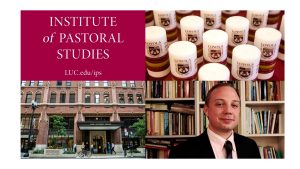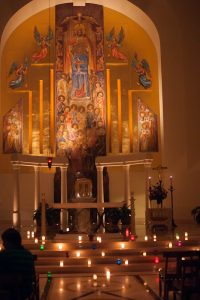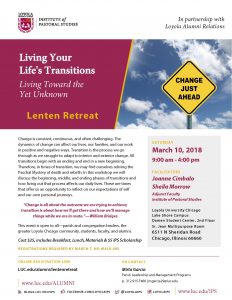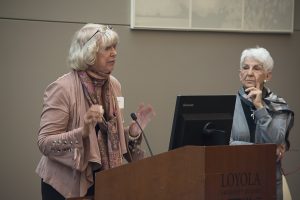A Lenten reflection from IPS Assistant Professor, Michael Canaris:
Theologian Daniel Groody, CSC has reflected on strengthening our spiritual disciplines in various demonstrations of solidarity and renewal, some of which are particularly appropriate for Lent: focusing on prayer, simplicity and recollection in regular moments like the Sabbath. One of the most eye-opening of these practices he suggests is considering a “fast from technology.”
The average American checks their phone every 12 minutes or over 80 times per day. More than two-thirds of us get at least substantial portions of our news from social media sources, which are intentionally designed to offer stories based on previous inclinations and interests. Self-sorting “traditional” media outlets on television and radio provide much of the same. All of this results in an increase in tribalism and the silos of echo-chambers that characterize so much of our public discourse. Dialogue with one another becomes strained. And if we claim to love God who we cannot see while refusing to hear the cries of our neighbor who we do, then we are liars according to the Word of God.
We often have recourse to fall back somewhat easily on the (admirable) directives of the church when it comes to questions of what our fasts should look like during Lent. These regular calls to penitence help us raise our hearts and minds to God, to focus on our radical dependence and constant need for God’s presence, forgiveness and revitalization in our lives.
But it’s also important to remember that God does not somehow intrinsically prefer one half of our surf and turf predilections over the other on certain days of the week. Choosing lobster over filet on Friday merely out of a rigorist interpretation of the law offers negligible impact on one’s spiritual life, and even less on the nature of God’s unbegotten and eternal beatitude and beneficence. (That said, I have eaten meatballs after midnight on early Saturday morning raids to the refrigerator more times in my life than I would like to confess in public.)
But to recalibrate the grounding of our self-mortifications consistently, it is essential to return often to the words of the prophet Isaiah, among my favorite in all of Scripture:
“Why do we fast, but You do not see?
Why humble ourselves, but You do not notice?”
“Look,” says the Lord, “you serve your own interest on your fast day, and oppress all your workers.
You fast only to quarrel and to fight and to strike with a wicked fist.
Such fasting as you do today will not make your voice heard on high.
Is such the fast that I choose, a day to humble oneself?
Is it to bow down your head like a reed, and to lie in sackcloth and ashes?
And you call this a fast, a day acceptable to the Lord?
Is not this rather the fast that I desire: to loosen the bonds of injustice, to undo the thongs of the yoke, to let the oppressed go free, and to break every yoke?
Is it not to share your bread with the hungry, and to bring the foreigner into your house; when you see the naked, to cover them, and not to hide yourself from your own kin?
Then your light shall break forth like the dawn, and your wounds shall be healed quickly.”
Our use of technology, which has given us countless blessings, is also increasingly enabling us to practice all too habitually the last of these divine condemnations. When our phones and computers hinder real connections and instead allow us sufficient cover “to hide our humanity from our own kin,” we know that we have not only a cultural but a theological problem.
Fasting from food is not the same thing as forced starvation. So too, a willingness to examine our practices regarding technological communication is not a compulsory abandonment of those realities that are necessary for the betterment of our professional and personal lives. But an honest scrutiny will likely reveal addictive or detestable practices for which a day of fasting may now be appropriate or necessary.
This may be the year when assessing and addressing these tendencies could help us grow closer both to our human neighbor and to God.
 This reflection first appeared in Catholic Star Herald. Michael Canaris, PhD is an Assistant Professor at IPS. You can reach him at mcanaris@luc.edu.
This reflection first appeared in Catholic Star Herald. Michael Canaris, PhD is an Assistant Professor at IPS. You can reach him at mcanaris@luc.edu.
~~~~~~~~~~~~~~~~~~~~~~~~~~~~~~~~~~~~~~~~~~~~~~~
Join the Loyola community in prayer and celebration at HOLY WEEK services and events across the Chicagoland campuses. Click here.
~~~~~~~~~~~~~~~~~~~~~~~~~~~~~~~~~~~~~~~~~~~~~~~
To learn more about IPS, go to https://www.luc.edu/ips/. For those interested in applying to IPS, go to https://gpem.luc.edu/apply/.





